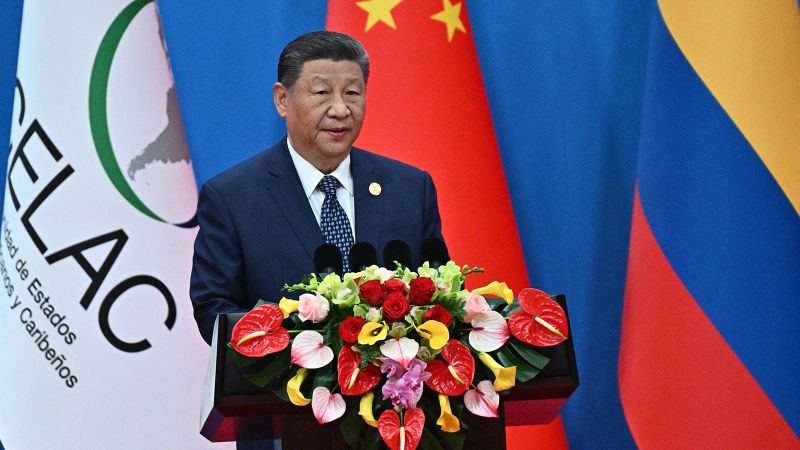In a significant development within the ongoing trade tensions between the United States and China, Chinese President Xi Jinping has made poignant remarks criticizing what he referred to as “bullying” and “hegemonism.” This statement marks his first public commentary following a newly brokered temporary truce regarding tariffs that have characterized the tumultuous trade war between the two major economies. Xi’s comments were delivered at a summit in Beijing, attended by Latin American and Caribbean officials, where he emphasized the critical need for unity and cooperation among nations amid unprecedented global changes.
Xi underscored the notion that the world is experiencing “great changes unseen in a century,” a sentiment that reflects the evolving global landscape beset by shifting economic power dynamics. The Chinese leader, speaking to officials from Latin America and the Caribbean, highlighted that in such times, collaboration among nations becomes not just beneficial, but essential. These remarks point towards the increasing recognition of multilateralism as a cornerstone for global peace and prosperity during uncertain times.
One of the central themes of Xi’s address was the futility of tariff and trade wars. “There are no winners in tariff wars or trade wars. Bullying or hegemonism only leads to self-isolation,” he stated, reiterating the warning he has consistently relayed throughout the trade hostilities that escalated during President Donald Trump’s administration. His comments serve as a reflection of China’s broader stance that trade conflicts ultimately harm all parties involved, creating a narrative that positions China as not just a participant in the global economy but as a proponent of collaborative progress.
Notably, Xi’s remarks came on the heels of a surprising development in the trade conflict: the United States and China announced plans to substantially reduce tariffs on each other’s goods for an initial period of 90 days. This announcement, described as a breakthrough, has provided a momentary reprieve in what has been a fierce tariff war. The easing of trade restrictions has raised optimism in global markets, as investors reacted positively to the possibility of lessening economic strain between the world’s two largest economies.
The implications of these tariffs have been significant, catalyzing market volatility, disrupting trade flows, and raising warnings about the potential onset of a global recession. The trade war imposed by tariffs has cast a shadow over the economies of both nations, and its repercussions have rippled throughout global supply chains and market confidence.
As nations grapple with the fallout of this extensive economic conflict, Xi’s declarations about self-isolation resonate deeply in the complex web of international relations. They reflect an understanding that economic integration and cooperation can foster mutual growth, rather than isolationism, which ultimately leads to detrimental outcomes for all involved. The summit, where Xi shared his insights, underscores China’s strategic engagement with Latin American nations, aligning interests toward collective development while positioning China as a counterbalance to Western dominance.
In conclusion, the temporary truce in tariffs between the United States and China represents more than just a pause in hostilities; it is indicative of a broader recognition by world leaders that collaboration is essential in navigating the depths of economic intricacies. Xi Jinping’s rhetoric against bullying and hegemonism encapsulates a call to action for nations to come together during transformative times. This evolving narrative in international trade points to a potential paradigm shift, where historical grudges may yield to cooperative frameworks aimed at mutual advancement and stability in an increasingly interconnected world. This is a developing situation and more updates will follow as negotiations continue and reactions unfold.



